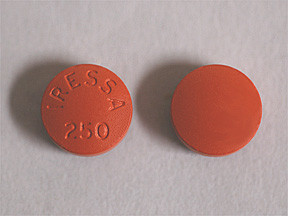GEFITINIB - ORAL
PHONETIC PRONUNCIATION: (ge-FI-ti-nib)
COMMON BRAND NAME(S): Iressa
GENERIC NAME(S): gefitinib
Uses
USES: Gefitinib is used to treat lung cancer. It works by slowing or stopping the growth of cancer cells. Gefitinib blocks a certain protein (an enzyme called tyrosine kinase).
How to use GEFITINIB - ORAL
HOW TO USE: Take gefitinib by mouth once daily, with or without food, or as directed. Medications which reduce or completely block stomach acid (e.g., proton pump inhibitors/PPIs, H2 blockers, antacids) may decrease the absorption of gefitinib. This could decrease the effectiveness of gefitinib. Consult your doctor or pharmacist if you are taking any of these medications. Use this medication regularly in order to get the most benefit from it. To help you remember, use it at the same time each day.
Side Effects
Precautions
Interactions
Overdose
Images
Reviews
Faq for GEFITINIB - ORAL
Gefitinib is an oral medication that belongs to a class of drugs known as tyrosine kinase inhibitors. It is used for the treatment of certain types of non-small cell lung cancer (NSCLC) that have specific mutations in the epidermal growth factor receptor (EGFR) gene.
Gefitinib works by blocking the action of the EGFR protein, which is involved in the growth and proliferation of cancer cells. By inhibiting this protein, Gefitinib helps slow down the growth and spread of cancer cells.
Some common side effects of Gefitinib may include diarrhea, skin rash, acne, dry skin, nausea, vomiting, decreased appetite, and nail changes. It is important to notify your doctor if you experience any severe or persistent side effects.
Gefitinib is usually taken once daily, with or without food. It is important to follow your doctor's instructions on how to take the medication. Do not increase or decrease the dose without consulting your healthcare provider.
Gefitinib may interact with certain medications, including certain antibiotics, antifungals, antidepressants, and heart medications. It is crucial to inform your doctor about all the medications you are taking to avoid any potential interactions.
The response to Gefitinib treatment may vary from person to person. Some individuals may show a response within a few weeks, while others may require a longer period of treatment. It is important to continue taking the medication as prescribed by your doctor.
It is important to notify your doctor if you have any pre-existing medical conditions, such as liver disease, lung disease, or a history of eye problems. You should also inform your doctor if you are pregnant or planning to become pregnant, as Gefitinib may cause harm to the unborn baby.
While Gefitinib can be effective in treating certain types of NSCLC, it does not cure the disease. It is used to slow down the growth and spread of cancer cells, improve symptoms, and prolong survival. Your doctor will determine the most appropriate treatment plan for you.
If you miss a dose of Gefitinib, take it as soon as you remember. However, if it is close to the time for your next scheduled dose, skip the missed dose and resume your regular dosing schedule. Do not take a double dose to make up for a missed one.
Warning
WARNING: Gefitinib has rarely caused very serious (possibly fatal) liver disease. Get medical help right away if you develop symptoms of liver disease, including stomach/abdominal pain, extreme fatigue, dark urine, yellowing eyes/skin. Gefitinib has also rarely caused very serious (possibly fatal) holes in the wall of the stomach or intestines. Get medical help right away if you develop stomach/abdominal pain, black/bloody stools, or vomit that looks like coffee grounds.
Disclaimer
IMPORTANT: HOW TO USE THIS INFORMATION: This is a summary and does NOT have all possible information about this product. This information does not assure that this product is safe, effective, or appropriate for you. This information is not individual medical advice and does not substitute for the advice of your health care professional. Always ask your health care professional for complete information about this product and your specific health needs.

No Reviews Yet